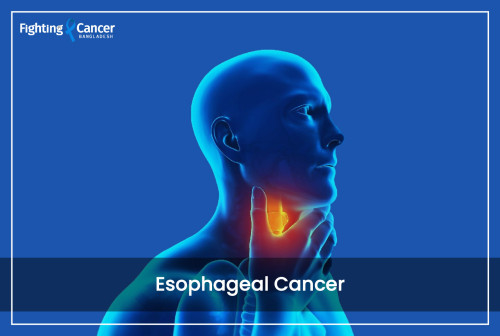
Esophageal cancer occurs in the esophagus (a hollow, muscular tube that carries food and drink to the stomach). This cancer mostly develops in the inner lining of the esophagus and may gradually spread to the lymph nodes and other organs.
Statistics
Esophageal cancer is mostly found in men than women. It is the 8th most common cancer around the world. Esophageal cancer is mostly found in older people aged more than 55.
Symptoms
- A sore or lump on the lip or in the mouth
- A white and/or red patch on the gums, tongue, or cheeks
- Unusual bleeding, pain, or numbness in the mouth
- Swelling leads to poor-fitting dentures
- A lump or thickening in your lip, mouth, or throat
- Difficulty in moving your jaw
- Weight loss
Causes
- Smoking
- Chronic heartburn
- Heavy consumption of alcohol
- Obesity
- Human papillomavirus.
- Barett’s esophagus
- History of cancers
- Acid reflux
Risk Factors
- Gender (men)
- Age (over 55)
- Prolonged sun exposure
- Long-term irritation caused by ill-fitting dentures
- A diet low in fruits and vegetables
- Immunosuppressive drugs
- History of head and neck cancer
- Radiation exposure
- Lichen planus
- Drinking maté, betel quid
- Fanconi’s Anemia
- Dyskeratosis Congenita
Complications
If esophageal cancer is not diagnosed earlier or remains untreated, cancer patients may develop vomiting, hematemesis, aspiration pneumonia, melena, and severe chest pain.
Prevention
- Avoiding tobacco in all forms
- Regular oral examination
- Moderate consumption of alcohol
- Cleaning dentures regularly
- Limiting sun exposure
- Using a lip balm with sunscreen and a hat with a brim, well-rounded
- A healthy diet with a variety of fruits and vegetables.
Treatment
The treatment depends on the patient’s health and the current condition of esophageal cancer, where it is in the esophagus and is confined in the original area or spread. During and after treatment, patients may require some check-ups, tests, and scans.
The treatment may include:
- Surgery
If esophageal cancer is diagnosed at the primary stage and has not spread yet to other parts of the body, the oncologist may suggest surgery.
- Chemotherapy
Chemotherapy is initiated to use medicines to kill cancer cells. Cancer patients may have chemotherapy before surgery or after surgery.
- Radiotherapy
Radiotherapy is used to treat early cancer and to help control the symptoms of esophageal cancers with high-energy rays of radiation.
- Targeted medicines and immunotherapy
Sometimes, oncologists may advise targeted medicines and immunotherapy. These are used to stop the growth of cancer and boost immunity.

